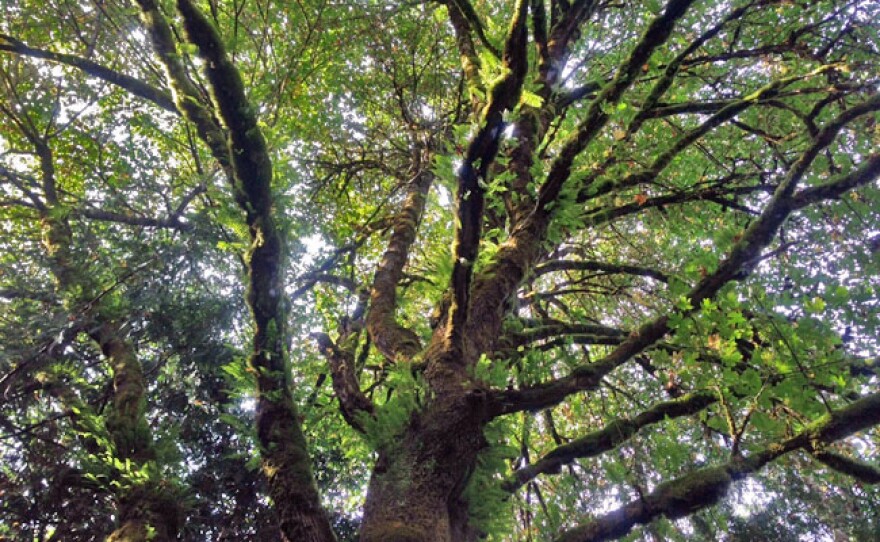One of the most prominent guitar makers in the country unknowingly purchased poached bigleaf maple taken from a national forest in southwest Washington state. That’s according to a federal indictment unsealed in Seattle this week.
Maryland-based PRS Guitars is not implicated in the case, but a small mill owner and three alleged poachers are.
The wood on these guitars has a shiny almost holographic look with mesmerizing patterns. Carlos Santana plays a figured-maple-topped electric guitar by PRS. He’s one of the company’s signature artists.
This highly sought-after music wood is found in the Pacific Northwest -- in the towering western bigleaf maple. But not every tree possesses the prized patterns. The trees that do are rare and valuable and that makes them a target for poachers.
'They slaughtered all the trees'
Federal prosecutors said in this case the poachers worked under the cover of night and left behind a lot of damage.
“And it looked like, some people described it as a bomb going off,” said Assistant U.S. Attorney Seth Wilkinson describing one of the poaching sites discovered in Washington’s Gifford Pinchot National Forest. It was near a popular campground called Iron Creek.
Wilkinson said the alleged poachers had a special name for that location: the slaughterhouse.
“I think because that’s what they did was they targeted the specific place and just went in and slaughtered all the trees,” Wilkinson said.
Wilkinson said just like with animal poaching, the woodcutters took only what they were after.
“They would cut down these trees, choose what they call the cream, which is really the very nicest parts of the trees, and wasting the rest and selling it for their own financial benefit,” he said.
First Lacey Act prosecution of a mill owner
In this case, the alleged buyer was Harold Clause Kupers, owner of a company called J&L Tonewoods. The company’s website says it supplies some of the larger guitar makers with bigleaf maple.
According to the indictment, Kupers repeatedly purchased illegally harvested maple wood in 2011 and 2012. He’s being charged under the federal Lacey Act -- a law designed to protect fish, wildlife, and plants.
Wilkinson said this is the first Lacey Act prosecution of a mill owner for trafficking in bigleaf maple.
“The message is that you can’t turn a blind eye, you can’t buy products that you know are stolen, make a huge profit off it and then just say, 'I didn’t know what I was doing,’” Wilkinson said.
Kupers allegedly sold that stolen wood for three times what he paid for it, earning $800,000 over a two-year period. His buyers, according to the indictment, included PRS Guitars and an Oregon company called North American Wood Products that supplies instrument makers. Neither is implicated in the case.
'It really damages our reputation'
In a statement, PRS says it “has fully cooperated with the government’s investigation and prosecution of J&L Tonewoods.” In a 2013 interview, PRS’s longtime wood buyer Michael Reid acknowledged that maple theft is a problem.
“There are some unscrupulous wood vendors that are going to buy stolen wood and they’re pretty well known throughout the industry,” Reid noted. “We don’t buy from them.”
Reid said that PRS worked with trusted vendors, but acknowledged he didn’t require verification that every load of wood he purchased was legitimately sourced.
“There has to be a certain amount of trust,” Reid said. “I’m not going to ask these guys for every one of their sources.”
The indictment said Kupers “falsely represented” to his buyers that the maple wood had been legally harvested.
Cliff Chulos is president of North American Wood Products, the other buyer of the allegedly stolen wood. On speakerphone with his vice president and chief buyer in the room, he said he’s shocked.
“We hang our hat on the fact that all over the world what we ship is legal wood,” Chulos said.
Chulos said his company has strict paperwork requirements for its vendors and, according to his chief wood buyer, Kupers always complied.
“It really damages our reputation and you can do more damage in 10 minutes that takes you 30 years to build,” Chulos said.
Chulos said he would be willing to pay to fund an audit system to ensure figured maple is legally sourced.
Kupers has pleaded not guilty to all charges. A woman who answered his business phone identified herself as his wife and said, “Our company buys and sells figured maple. We don’t steal it, we don’t poach it.”
If convicted, Kupers faces up to 10 years in prison.




